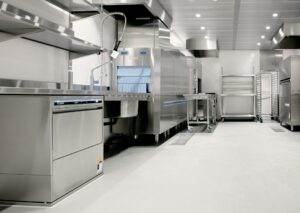In today’s fast-paced world, appliances play a crucial role in our daily lives. From refrigerators to washing machines, these devices make our lives easier and more convenient. However, when these appliances break down, it can be a major inconvenience and expense. That’s why it’s important to have budget-friendly appliance repair strategies in place. In this blog post, we will explore various ways to save money on appliance repairs and maintenance, from DIY repairs to negotiating repair costs with service providers. Additionally, being proactive with regular maintenance can help prevent costly breakdowns in the first place. We’ll also discuss how certain warranties and service plans can significantly help you save on appliance repair costs. By staying informed and adopting these strategies, you can ensure that appliance issues don’t disrupt your daily routine or drain your wallet.
Table of Contents
- Key Takeaways
- DIY Repairs: Tips and Tricks for Fixing Appliances at Home
- The Importance of Regular Maintenance for Appliance Longevity
- Hiring Professional Repair Services: How to Save Money
- Negotiating Repair Costs with Service Providers
- Using Manufacturer Warranties and Extended Service Plans to Your Advantage
- Recycling and Upcycling Appliances: Eco-Friendly Repair Alternatives
- When to Consider Replacing an Appliance Instead of Repairing It
- Final Thoughts: Making Informed Decisions About Appliance Repair and Maintenance
- What Are Some Budget-Friendly Repair Strategies for Appliances?
- FAQs
- What is Appliance Budget-Friendly Repair Strategies?
- What are the benefits of using Appliance Budget-Friendly Repair Strategies?
- What are some examples of Appliance Budget-Friendly Repair Strategies?
- What are the common appliances that can be repaired using Appliance Budget-Friendly Repair Strategies?
- What are the factors to consider when choosing Appliance Budget-Friendly Repair Strategies?
- What are the risks of using Appliance Budget-Friendly Repair Strategies?
Key Takeaways
- Regular maintenance can extend the lifespan of your appliances and save you money in the long run.
- DIY repairs can be cost-effective, but it’s important to know your limits and when to call in a professional.
- Negotiating repair costs with service providers can help you save money, but be sure to do your research and compare prices.
- Manufacturer warranties and extended service plans can provide added protection and peace of mind for your appliances.
- Recycling and upcycling appliances can be a sustainable and budget-friendly alternative to traditional repairs.
Identifying Common Appliance Issues and Solutions
Before diving into the world of appliance repair, it’s important to understand the common issues that can arise with these devices. Some of the most common problems include a refrigerator not cooling properly, a dishwasher not cleaning dishes effectively, or a dryer not heating up. By identifying these issues, you can then find the appropriate solutions.
For example, if your refrigerator is not cooling properly, it could be due to a faulty thermostat or a clogged condenser coil. In this case, you can try cleaning the condenser coil or replacing the thermostat yourself before calling a professional repair service. Similarly, if your dishwasher is not cleaning dishes effectively, it could be due to a clogged spray arm or a malfunctioning water inlet valve. By troubleshooting these issues yourself, you can potentially save money on repair costs.
DIY Repairs: Tips and Tricks for Fixing Appliances at Home
If you’re feeling handy and confident in your skills, DIY repairs can be a great way to save money on appliance repairs. However, it’s important to approach these repairs with caution and take necessary safety precautions.
Before attempting any DIY repairs, make sure to do thorough research and gather all the necessary tools and replacement parts. There are many online resources available that provide step-by-step guides for repairing specific appliances. These guides often include detailed instructions and even videos to help you through the process.
When attempting DIY repairs, always prioritize safety. Make sure to unplug the appliance before starting any repairs and wear protective gear, such as gloves and safety glasses. If you’re unsure about a particular repair or if it involves complex electrical work, it’s best to leave it to the professionals.
The Importance of Regular Maintenance for Appliance Longevity
Prevention is always better than cure, and this holds true for appliances as well. Regular maintenance can help extend the lifespan of your appliances and prevent costly repairs down the line.
One of the most important maintenance tasks is cleaning. Regularly cleaning your appliances, such as removing lint from the dryer vent or cleaning the coils on your refrigerator, can help improve their efficiency and prevent breakdowns. Additionally, it’s important to follow the manufacturer’s guidelines for maintenance tasks, such as changing filters or lubricating moving parts.
Another important aspect of maintenance is inspecting your appliances for any signs of wear and tear. Look out for loose wires, leaks, or strange noises that could indicate a potential problem. By catching these issues early on, you can address them before they escalate into major repairs.
Hiring Professional Repair Services: How to Save Money
While DIY repairs can be a cost-effective option, there are times when it’s best to leave the job to the professionals. When hiring professional repair services, there are several factors to consider to ensure you’re getting the best value for your money.
Firstly, it’s important to do your research and find reputable repair services in your area. Look for companies with positive reviews and a track record of providing quality service. Additionally, consider asking for recommendations from friends or family who have had positive experiences with repair services.
Once you’ve narrowed down your options, don’t be afraid to shop around and compare prices. Get quotes from multiple service providers and ask about any additional fees or charges that may apply. Keep in mind that the cheapest option may not always be the best, so consider the overall value and reputation of the company.
Negotiating Repair Costs with Service Providers
When it comes to negotiating repair costs with service providers, there are several strategies you can employ to potentially save money.
Firstly, be prepared to negotiate. Don’t be afraid to ask for a discount or inquire about any available promotions or specials. Service providers may be willing to offer a lower price to secure your business, especially if you’re a repeat customer or if you’re getting multiple appliances repaired at once.
Additionally, consider offering to pay in cash. Some service providers may be willing to offer a discount for cash payments, as it saves them from paying credit card processing fees.
Lastly, don’t hesitate to get a second opinion. If you receive a quote that seems too high, consider reaching out to another repair service for a second opinion. This can help you determine if the initial quote was fair and if there are any alternative solutions that may be more cost-effective.
Using Manufacturer Warranties and Extended Service Plans to Your Advantage
Manufacturer warranties and extended service plans can be valuable tools for saving money on appliance repairs. It’s important to understand how these warranties and plans work and how to use them effectively.
Manufacturer warranties typically cover repairs or replacements for a specific period of time after the purchase of an appliance. If your appliance breaks down within this warranty period, you can contact the manufacturer for assistance. However, it’s important to read the fine print and understand what is covered under the warranty and what is not.
Extended service plans, on the other hand, are additional warranties that can be purchased separately from the manufacturer. These plans typically extend the coverage beyond the original warranty period and may include additional benefits such as priority service or discounted repairs.
When using warranties or service plans, make sure to keep all documentation and receipts in a safe place. This will make it easier to file a claim or request service when needed. Additionally, be aware of any deductibles or fees that may apply when using these warranties or plans.
Recycling and Upcycling Appliances: Eco-Friendly Repair Alternatives
When an appliance reaches the end of its lifespan and cannot be repaired, it’s important to consider eco-friendly alternatives to simply throwing it away. Recycling and upcycling are two great options for reducing waste and giving old appliances a new purpose.
Recycling involves disassembling the appliance and separating the different components for recycling. Many cities have recycling programs in place that accept appliances, or you can contact local recycling centers for more information.
Upcycling, on the other hand, involves repurposing the appliance for a different use. For example, an old washing machine drum can be turned into a fire pit or a planter. There are countless creative ideas for upcycling appliances available online, so let your imagination run wild!
By recycling or upcycling old appliances, you not only reduce waste but also contribute to a more sustainable future.
When to Consider Replacing an Appliance Instead of Repairing It
While repairs can often be a cost-effective solution, there are times when it’s more practical to replace an appliance instead. When making this decision, there are several factors to consider.
Firstly, consider the age of the appliance. If it’s nearing the end of its expected lifespan, it may be more cost-effective to invest in a new appliance rather than spending money on repairs that may only provide a temporary fix.
Additionally, consider the cost of repairs compared to the cost of a new appliance. If the repair costs are close to or exceed the cost of a new appliance, it may be more practical to replace it instead.
Lastly, consider the energy efficiency of the appliance. Older appliances tend to be less energy-efficient compared to newer models. By replacing an old appliance with a more energy-efficient one, you can potentially save money on your energy bills in the long run.
Final Thoughts: Making Informed Decisions About Appliance Repair and Maintenance
In conclusion, having budget-friendly appliance repair strategies in place is essential for saving money and reducing waste. By identifying common appliance issues and troubleshooting them yourself, you can potentially save on repair costs. Regular maintenance is also crucial for extending the lifespan of your appliances and preventing breakdowns.
When hiring professional repair services, it’s important to do your research and negotiate costs to get the best value for your money. Manufacturer warranties and extended service plans can also be valuable tools for saving money on repairs. And when an appliance reaches the end of its lifespan, consider recycling or upcycling it to reduce waste.
By making informed decisions about appliance repair and maintenance, you can save money, extend the lifespan of your appliances, and contribute to a more sustainable future.
What Are Some Budget-Friendly Repair Strategies for Appliances?
When it comes to maintaining household appliances, there are several efficient appliance repair techniques that can save you money. Simple tasks like cleaning coils, replacing worn gaskets, and checking for leaks can prolong the lifespan of your appliances without breaking the bank. Regular maintenance can prevent costly repairs down the line.
FAQs
What is Appliance Budget-Friendly Repair Strategies?
Appliance Budget-Friendly Repair Strategies refer to the techniques and methods used to repair appliances without spending too much money.
What are the benefits of using Appliance Budget-Friendly Repair Strategies?
The benefits of using Appliance Budget-Friendly Repair Strategies include saving money, extending the lifespan of appliances, reducing waste, and promoting sustainability.
What are some examples of Appliance Budget-Friendly Repair Strategies?
Some examples of Appliance Budget-Friendly Repair Strategies include DIY repairs, using replacement parts, cleaning and maintenance, and seeking professional help from local repair shops. Exploring online tutorials and forums can also provide valuable insights and techniques for common appliance issues, making DIY repairs more feasible. Additionally, many local repair shops offer budget appliance repair solutions that can effectively address more complex problems without breaking the bank. By combining these strategies, homeowners can significantly extend the lifespan of their appliances while staying within their financial constraints.
What are the common appliances that can be repaired using Appliance Budget-Friendly Repair Strategies?
Common appliances that can be repaired using Appliance Budget-Friendly Repair Strategies include refrigerators, washing machines, dryers, dishwashers, ovens, and microwaves.
What are the factors to consider when choosing Appliance Budget-Friendly Repair Strategies?
The factors to consider when choosing Appliance Budget-Friendly Repair Strategies include the type of appliance, the extent of damage, the cost of repair, the availability of replacement parts, and the level of expertise required for the repair.
What are the risks of using Appliance Budget-Friendly Repair Strategies?
The risks of using Appliance Budget-Friendly Repair Strategies include causing further damage to the appliance, voiding the warranty, and risking personal injury or property damage. It is important to follow safety guidelines and seek professional help when necessary.



